Sowing Seeds Of CAMH In Ghana: (The 4 P’s of Child and Adolescent Mental Health)
By: Dr. Ruth Charlotte Sackey
Psychiatrist and CAMH Professional
Komfo Anokye Teaching Hospital, Kumasi, Ghana.
The Problem
Ghana is a lower middle income anglophone country located in West Africa, sharing borders with francophone countries; Burkina Faso, Cote D’Ivoire and Togo, with a population of about 30 million people (in 2018).
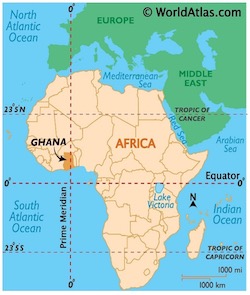
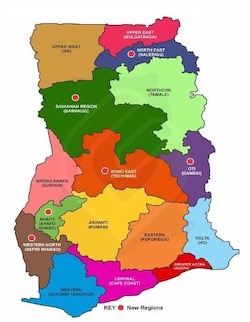
Picture showing location of Ghana in the world and right one showing the geographical regions in Ghana
For decades, child and adolescent mental health (CAMH) in Ghana was in the dark ages, clouded in obscurity. There were no specialized services for children and most CAMH cases were muddled together with adult cases. Mental health in general was relegated to the background, with a lot of stigma and widespread ignorance of mental illness. This has had severe consequences for child and adolescent mental health care and services in Ghana and wrongful knowledge and attitudes towards mental illness have had very debilitating consequences on children, families and societies. For example, wrongful association of the aetiology of CAMH disorders to evil spirit possession, curses or other superstitious beliefs led to many children receiving inhumane treatments like being fasted, chained or flogged, and in worse situations being thrown in rivers to return to their “supposed place of origin” claimed to be the river. Knowledge and expertise in CAMHS was limited and there was a lack of multidisciplinary care services for these children. Certain medications like stimulants were not readily available to manage cases of ADHD. Experts in the various disciplines needed to offer services were unavailable in most places in the country. Where available, the increased workload and demand brought with it a lot of inefficiency. Subspecialized training in CAMH was and is still a challenge and formal training usually had to be sought out of the country, for example in Nigeria, South Africa or outside the African continent.
The Process
Today, there is still a lot of attention needed to deal with the problem we have with CAMH in Ghana, but good news is we are not where we used to be!! More efforts have been channeled towards mental health advocacy by the Mental Health Authority of Ghana and some stakeholders. This has helped to reduce the stigma attached to mental illness and improved knowledge, attitudes and practices of people towards mental health. Progress has been made in this direction, but definitely more work is still needed to improve mental health literacy across the country. We have seen more health professionals showing interest in mental health and more doctors now entering into psychiatry residency training.
Training specially for CAMH is still a challenge for the country. The only Child Psychiatrist (German trained) in the country, Prof. Yaw Osei, retired from active public service in 2014. A major breakthrough for CAMH in Ghana came as a result of the training of four new psychiatrists in CAMH at different periods between 2016 to 2019 namely; Dr. Selassie Addom, Dr. Kwabena Kusi-Mensah, Dr. Peggy Asiedu Ekremet and Dr. Ruth Charlotte Sackey. They all obtained an 18-month Master of Science Degree in Child and Adolescent Mental Health from the Centre for Child and Adolescent Mental Health (CCAMH), University of Ibadan, Nigeria. These four professionals have since returned to their country and are working zealously to bridge the treatment gap for young people in Ghana. They are also promoting CAMH by sharing their knowledge and expertise with other colleagues. Advocacy programs channeled through the media has also helped to promote knowledge in CAMH and improve health-seeking behaviours.
The Progress
Over the past five years, CAMH services have improved and better care options are now available for Ghanaian youth. Multidisciplinary care services have been developed, though availability is limited to major cities, and the few teaching hospitals or Psychiatric hospitals. Collaboration with other relevant sectors such as the primary care services, educational sector, religious institutions and policy makers have also improved. Other disciplines are also being developed to cater for the needs in CAMH.
A case study of CAMH services in a Teaching Hospital in Ghana - a personal experiences as a CAMH professional
Looking back over the last five years since I joined the psychiatry unit, I see tremendous CAMH growth. Five years ago, there were barely any specialized services tailored for children at the facility where I work (the Komfo Anokye Teaching Hospital), especially with the retirement of the only Child Psychiatrist, and children with mental disorders were managed by general psychiatrists or medical officers, with very scarce resources. Today we have a general child clinic, a joint clinic with paediatric neurology, an abuse clinic, caregiver support groups and liaison with educational facilities.
The CAMH general clinic is run once weekly by a team of psychiatrists, a CAMH professional, clinical psychologists, occupational therapists, an art therapist, a speech therapist, a physiotherapist and a social worker. It is a one-stop clinic where services are made available in the same place to reduce the burden on clients and reduce fragmentation of services. CAMH related conditions seen include ADHD, Autism, Intellectual disability, learning disorders, mood disorders, anxiety disorders, stress related disorders and psychotic disorders. Between January to December 2021, a total of 492 children and adolescents were seen and managed at the clinic, and about 194 new cases were recorded. The clinic was initiated in 2017 and initially suffered a lot of challenges such as staff challenges and lack of occupational therapy services. However, from mid-2019 a lot of these barriers were overcome and the clinic currently serves as a major referral site for about 10 out of 16 geographical regions in the country.
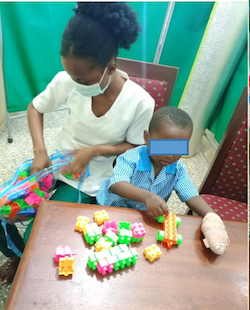
A child being during an occupational therapy session
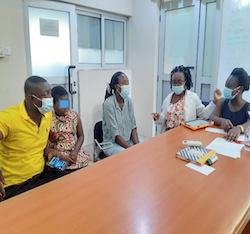
A child and her parents being assessed at the CAMH Clinic
The CAMH-Neuro joint clinic is another specialized clinic where a paediatric neurologist, paediatrician and the CAMH multidisciplinary team come together to provide services in one clinic. Conditions like Epilepsy, Down syndrome, Cerebral palsy, Tuberous Sclerosis, ADHD, and other conditions with neurological, mental and behavioural disturbances are assessed and managed. There is input from all team members involved in the clinic which promotes effective and holistic treatments, and ensures easy monitoring and follow-up.
The Abuse Clinic, a specialized clinic that was started in 2019, addresses all forms of abuse including physical, sexual, emotional abuse, and intimate partner violence, amongst all age groups, particularly children and adolescents. Young people have had the greatest representation among those reporting to the abuse clinic. Experts on the team include the paediatrician, gynaecologist, CAMH specialist, psychiatrists and psychologists who manage medical and psychosocial complications. Others like the social worker, legal practitioner and police officer on the team help affected individuals seek legal aid and justice.
A caregiver support group was started in May 2021, to provide psychosocial support to caregivers of children with neurodevelopmental disorders. Goals were to provide them support for their needs and concerns, empower them to support each other, provide education and resources to enable them to deal with the challenges of caring for their children, and help mobilize financial aid for needy families who find it difficult to provide for their children.
Liaison with educational facilities is made through the provision of salient medical reports for children, and making recommendations to assist in meeting the child’s educational needs. Special education services are available but limited and may at times not meet the child’s specific needs. Follow-up visits by the social worker to schools has been challenging due to scarce resources but we are working to resolve this.
The Prospects
A journey has begun and the future looks brighter for CAMH in Ghana. We are hopeful that as we continue identifying areas of need, we will continue to improve on them. Collaborations and support from all stakeholders is needed to ensure a smooth and successful journey. Children are the future of a nation and certainly their mental health cannot be neglected.
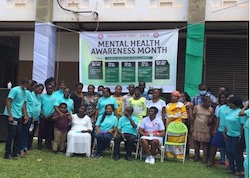
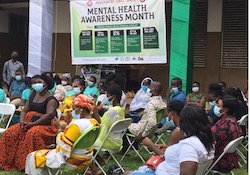
Some members of multidisciplinary team with caregivers during the launch of a support group

